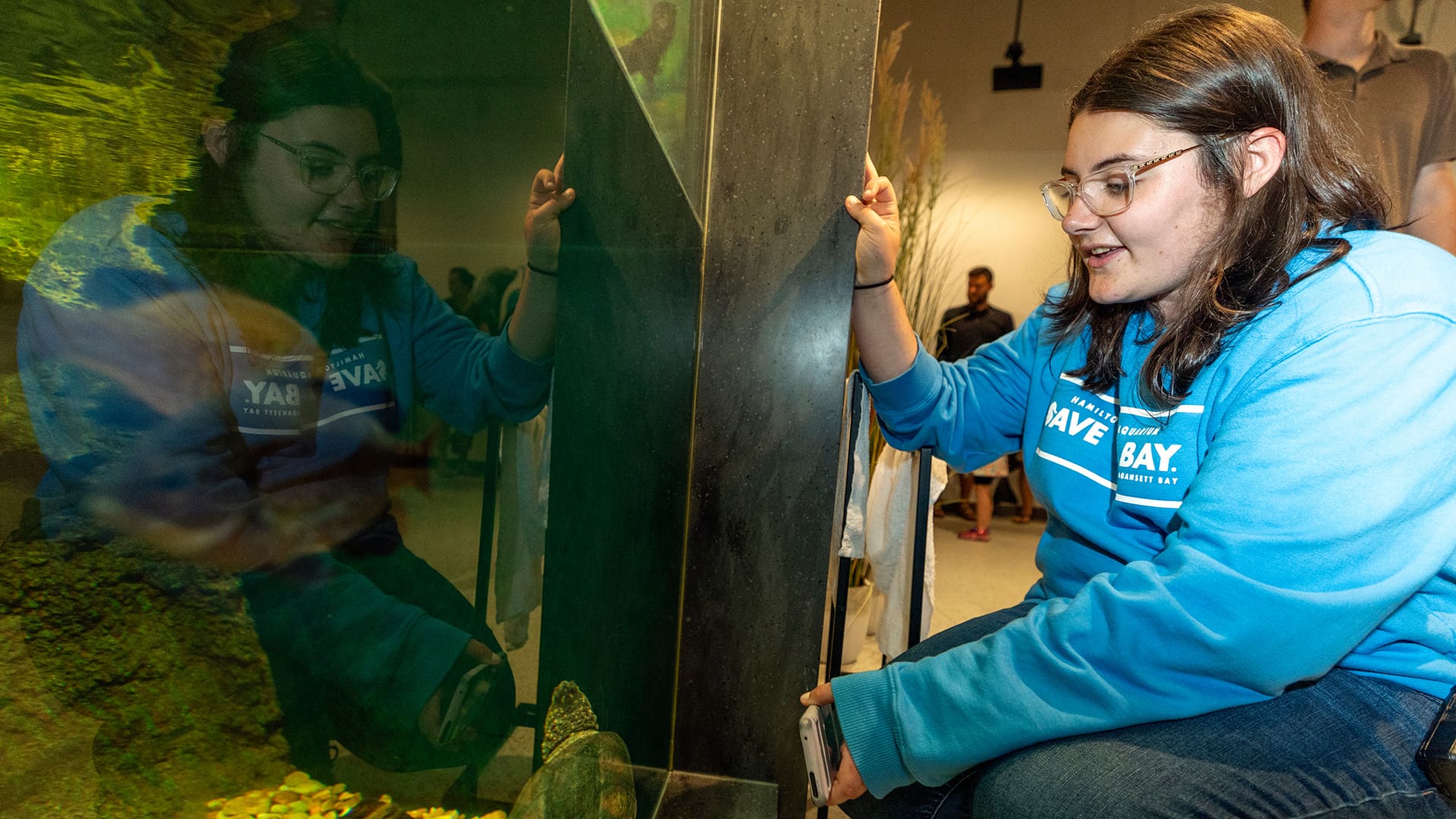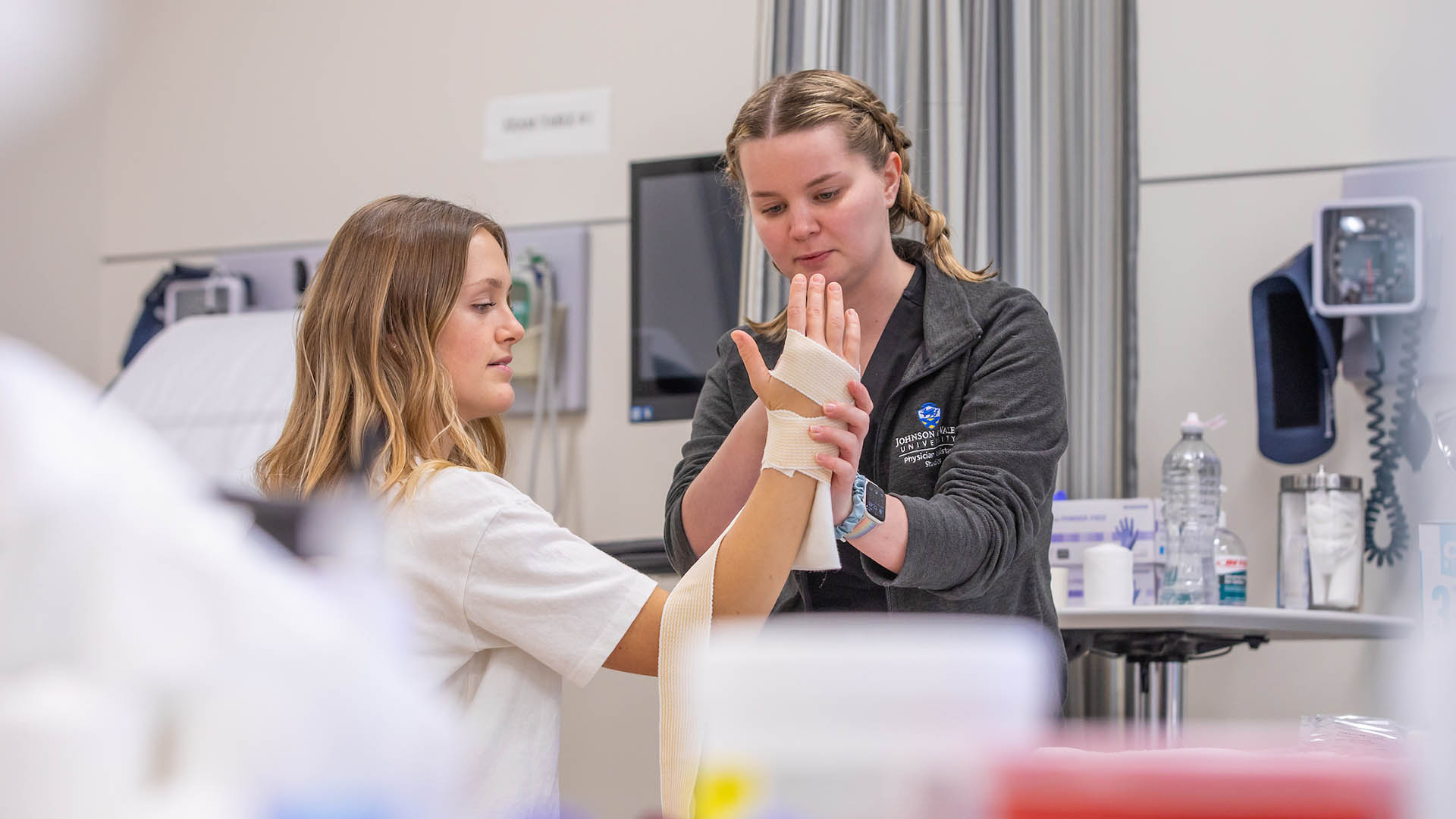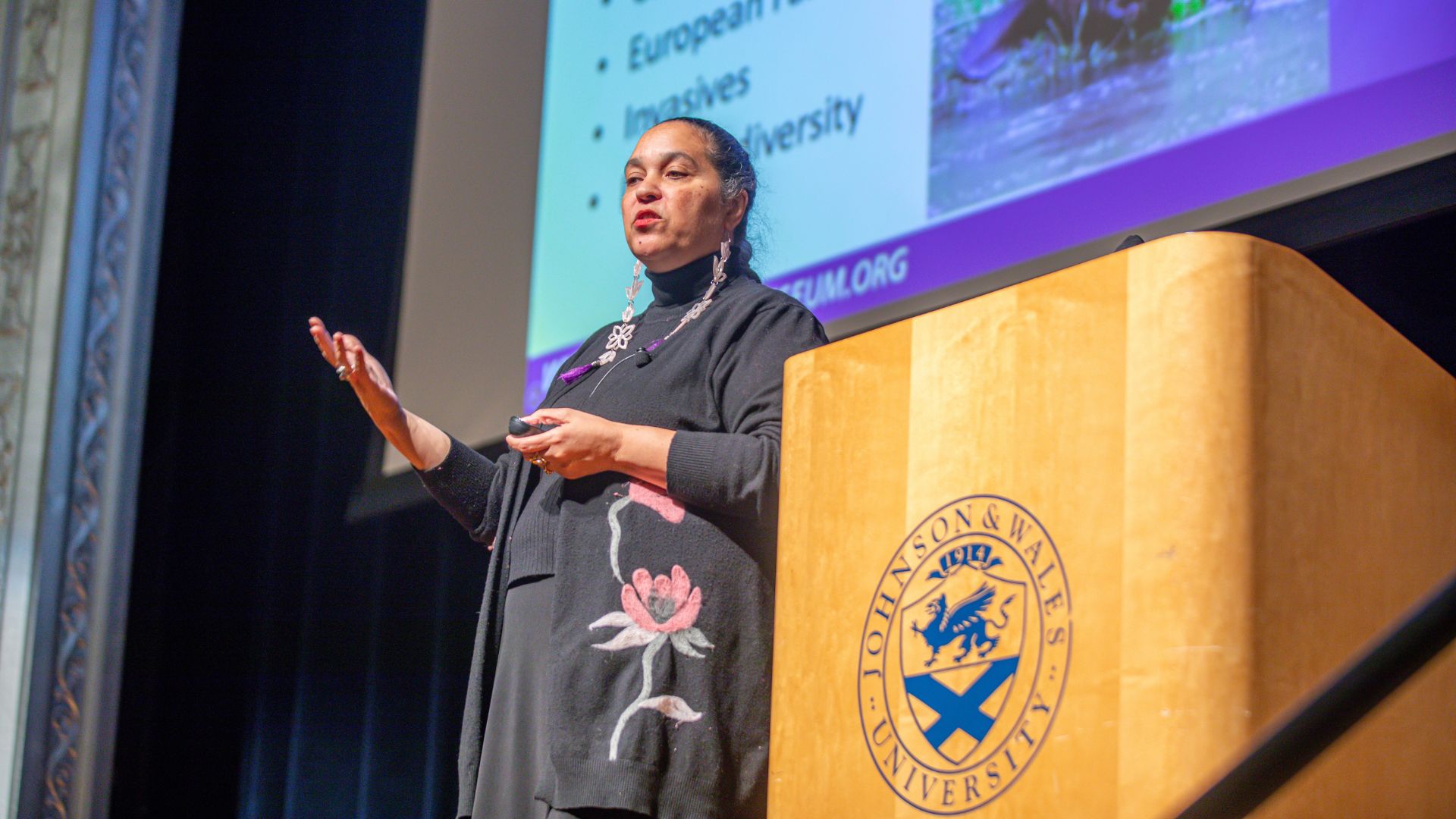Pawtucket Detective Connects Criminal Justice and Psychology to Solve Cold Cases
The fields of criminal justice and psychology are connected in many ways. First-year students in JWU’s Collaborative Learning Program (CLP) psychology and criminal justice cohort had the opportunity to learn about what both disciplines have in common recently from Detective Susan Cormier.
During a virtual class presentation, Cormier spoke to the students about the work she’s been doing for the Pawtucket Police Department focusing on investigating and solving cold cases. More specifically, she discussed the psychological impact these cases have on detectives and the families that are left behind after the crimes.
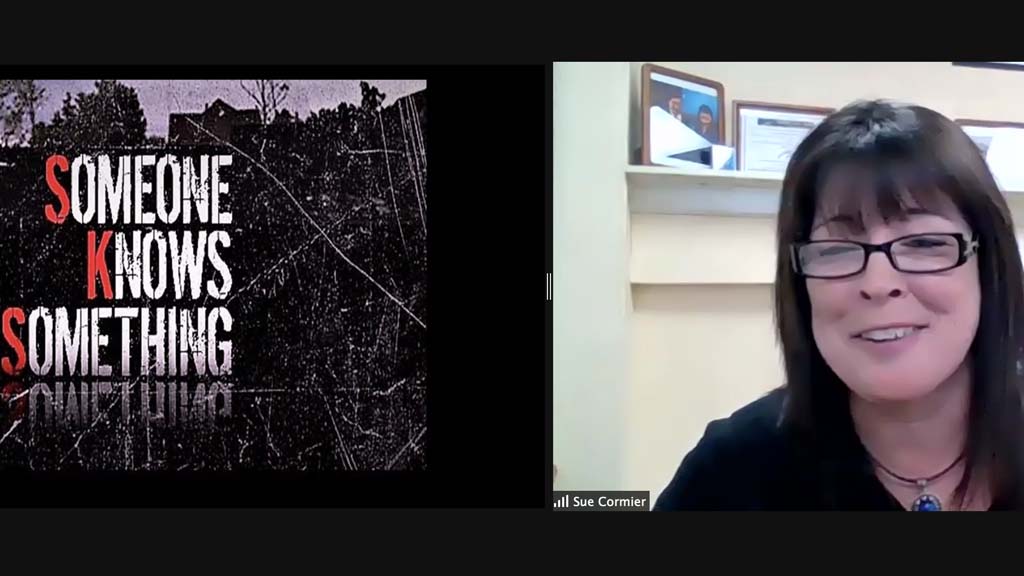
“We’ve been talking about the interdisciplinary nature between criminal justice and psychology all year,” says Professor Paul Sylvestre, Ph.D., who teaches the cohort along with Associate Professor Jessica Fede, Ph.D.
“We thought this was the best avenue to show the real connection [between the two]. Criminal justice cannot be studied or understood in a silo. It is so connected to other disciplines, and probably psychology more than anything else,” Sylvestre says. Before teaching at JWU, he worked for the Pawtucket Police Department for 22 years retiring in 2008.
Criminal justice cannot be studied or understood in a silo. It is so connected to other disciplines, and probably psychology more than anything else.”
Sylvestre and Fede have been teaching together as part of this CLP for four years. He adds that the cohort model provides students many benefits, including opportunities to develop a sense of community from the time they start at JWU, helping them build strong relationships with the faculty and other students, and giving them the chance to meet industry leaders. Faculty members who teach cohort classes also serve as advisors to students, which in turn helps further develop mentoring relationships.
“The students have at least four classes together throughout the academic year. In the fall they’re automatically registered for classes, but a lot of them take multiple classes together the following semester too. They get that connection right from the get-go,” he says.
In the fall semester, he adds, students in the cohort take Introduction to Psychology and Introduction to Criminal Justice, while in the spring they enroll in Law Enforcement and Abnormal Psychology. The classes usually take place back-to-back on the same days to allow for easier collaboration. And faculty work to coordinate assignments to ensure topics are related, which makes it easier for students to work more efficiently.
Connecting the Dots
Having Cormier speak to the classes gave the faculty a real-life opportunity to show students how criminal justice and psychology are connected on a daily basis.
Cormier, who’s been working for the police department for 28 years, told students about the various units she has worked with during her career, adding that she’s done a little bit of everything. “After graduating the Academy in 1993, I spent 12 years in the patrol division, which I absolutely loved because I was out there with the community. Six of those years I spent on the special response team, which some people also know as the SWAT team. In 2005 I was fortunate enough to be promoted to detective, and have worked in a variety of things in that division.” Her experience also includes working in the Youth Services Division, Financial Crimes, Identity Fraud and the Major Crime Unit.
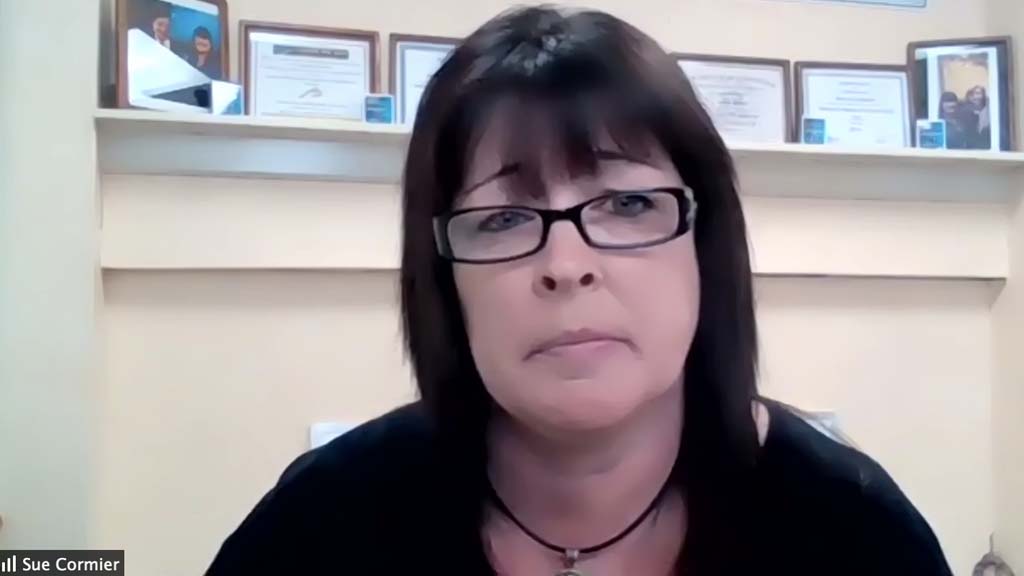
In 2018, Cormier was instrumental in the development of the Cold Case Unit for the department. And it was during that time that she proposed developing a playing card set featuring 52 unsolved homicide cold cases in Rhode Island to be released in the state prisons as a way of generating leads. She also founded the Rhode Island Cold Case Task Force.
“Cold case investigation has changed,” she says. “Everybody thinks cold cases are just old dusty files that nobody cares about, but that’s not the reality.” She adds she first heard about the playing card concept when a detective named Tommy Ray from Florida introduced it in his department back in 2005, after a similar card concept had been used during the Gulf War in the 1990s.
“Initially a lot of people laughed at him and thought it was a dumb idea, but he did it anyway and it was extremely successful. Today, there are 20 different states and four different countries that use them.”
To develop the playing card set, Cormier had to get buy-in from various stakeholders, including the Rhode Island Department of Corrections and the police chiefs from every department in the state. In addition, she had to speak to the victims’ families about her interest in these cold cases and how the card set would be used.
“Normally, when I speak at schools and universities, I generally stick to [describing] the playing card and other stuff. I don’t normally talk about the psychological impact that this has on the families and the detectives, because first and foremost, we’re opening old wounds for these families,” Cormier says about refocusing on investigating these cold cases. She adds that sometimes, for a variety of reasons, families haven’t heard from a detective in a very long time.
“When I started this, I was knocking on the doors of these families telling them what we wanted to do with the playing card project and work on their loved one’s case — there were a lot of tears. A lot of people said to me ‘I didn’t think anybody cared,’ and my response every time is ‘I care,’ because if it was my loved one, I would want to know that a detective is doing everything they could to give me answers. If I have the ability to do that as a detective, then that’s what I’m going to do. And I know that all of my fellow detectives that have cases like these feel the same way.”
A lot of people said to me ‘I didn’t think anybody cared,’ and my response every time is ‘I care.’
In these cases, Cormier notes, many times detectives end up working with family members to help them find access to services they might need as they deal with the loss of a loved one. “Some of the other things that we need to do [for them], from opening these wounds, is assist them with some of the mental health services they might need. We put them in touch with the victim’s advocate, and any type of counseling and even sometimes support groups with other people like themselves who have lost a loved one tragically. And a lot of times we need to be that shoulder for them to cry on, and an ear for them to vent to, and a voice for that victim, and their rock in any legal proceedings. If we have to go to court, I like to sit with the families and be there for them.”
The very nature of these cold cases that go unresolved, can lead to a lot of frustration both for families and detectives alike.
For detectives, Cormier says, working on these cases takes a tremendous emotional toll. “Although these cases are truly all about the victims and the families, [the work] does have a great impact on detectives because there’s a lot of pressure on them to succeed. Sometimes detectives have to regain the family’s trust when reopening an investigation. And this can lead to a fear of failure, because we don’t want to let them down after we’ve ripped off that Band-Aid by bringing back up memories of the most heart-wrenching thing in their lives.”
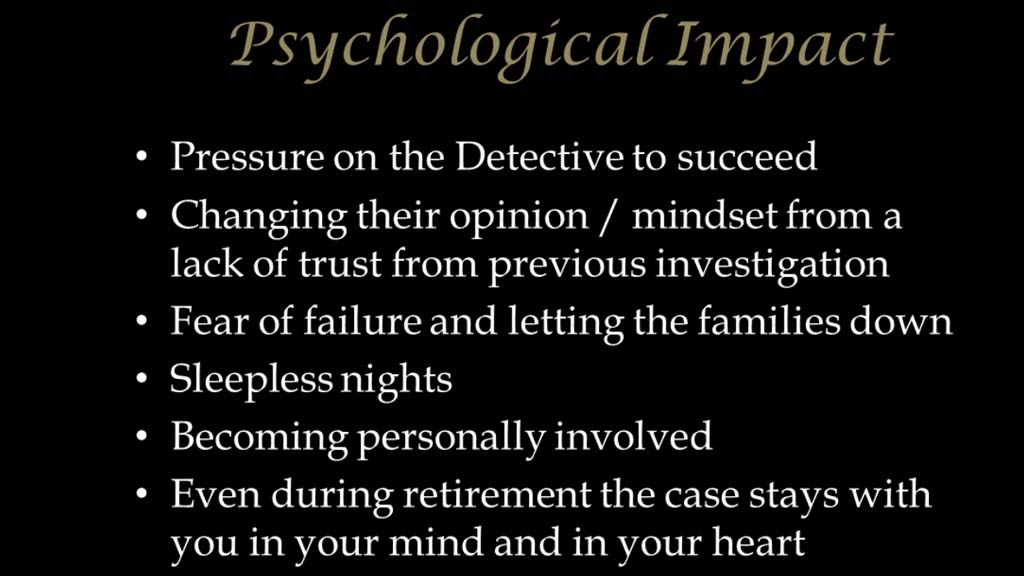
She adds finding a good work-life balance is key. “It’s important to do that because otherwise it’s going to eat you alive. [The work] can be all consuming sometimes and I have to remind myself to put it down for a while and take a break. I’m very fortunate that I’m happily married with three children,” she says.
When asked what advice she would give to students currently studying criminal justice or psychology who might be interested in going into the field of law enforcement, Cormier says she recommends it as a career without a doubt. “I think this is a wonderful career. It is very rewarding. We certainly do see a lot of difficult things, but you don't have to go it alone. Many, many years ago there was that stigma about having to be tough and [not let anyone] see that crack in the armor. Whereas now, you can ask for help and lean on each other a little bit more and that stigma isn't as bad. There’s a lot of great detectives out there, past, present, and hopefully future with a lot of students that are going to come in and take over for us.”
To learn more about Cormier’s work, visit the Cold Case RI website or find them on Facebook and Instagram.
